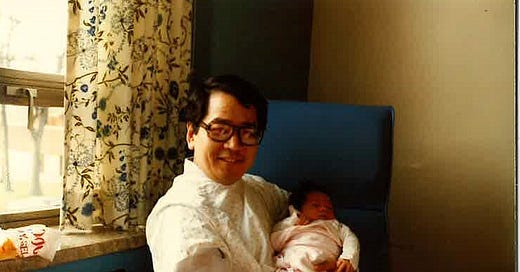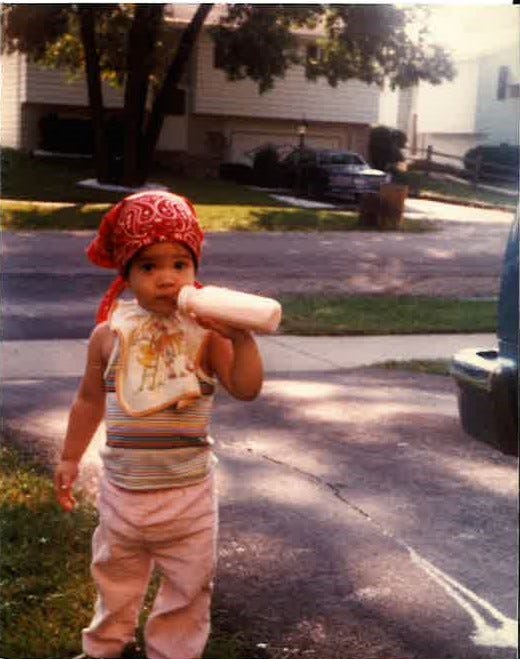I did not cry when I was born.
My father is the one who relates this story at reflective times in life. He was outside the hospital room, no part of the leg holding or cheering mother along. It was 1980 and women delivered babies in shared hospital rooms where the father wasn’t expected to attend the occasion. He was expected to pace the waiting room drinking coffee in Styrofoam cups or something.
Dad says he heard my mother panting the sounds of natural childbirth and then he heard nothing. The sinking fear of a dead baby crashed his consciousness. I’d like to say he burst in the door and demanded to see his second born child, but he, of course, just politely waited in his anxious misery for a nurse or doctor to emerge and tell him what they judge he needs to know. He does not say he was anxious or miserable when he tells this story. He says “I was concerned.”
I was not a dead baby. I was very much alive and silent gazing around the room. Taciturn and probably newborn blind in both eyes, but pleasantly placid like a monk. Mom says I looked around for a good long while, then I closed my eyes and didn’t open them again for two days.
If there’s any doubt that we are who we are the moment we burst forth into this world, this life, this lifetime and scene, I tell you that sounds exactly like me. I resonate with the reported memory of myself. Unconventional, yet polite. Regarding. Resting to gather my little baby thoughts from the journey and event of my birth. Eight days past my due date and a very easygoing child to become. I didn’t cry because I didn’t know anything yet about how beautiful, wrenching and moving this experience of living would be.
Now I love to cry. When it comes upon me, I pull out the stops and let it rain. Let your love rain down on me. Songs do it to me every single day and I wave the white flag at every concert I sway and sit through sniffling and shaking. Every time I do a guided meditation, my nose stops up due to the weeping. My coworker said she can’t understand why anyone cries during The Barbie Movie, “unless you’re really sensitive.” Oh that’s me, I replied. Do you have a tissue?
I’m training myself not to apologize for this. I’m bonafide bittersweet and cultivate these sorrows and beauties. I give myself full permission to cry. I’m living my authentic crying person life. Despite this, however, I do have to check myself just to refrain from automatically saying the ever terrible social trance knee-jerk phrase of, “Don’t cry,” when someone else is doing it.
Why did society do this to me? “Don’t cry” is consolation?
Must we all be hidden in shame under fig leaf unable to cry in public? When we break the rock and let the water flow, we apparently shame the viewer companion somehow, and the only instinctual phrase our baked in rearing and uncomfortable twitching can manage to kick out is - “Don’t cry.”
“Don’t cry, it will be all right.”
“Don’t cry, I’m right here.”
“Don’t cry, we’re going to fix it.”
“Don’t cry, Mommy needs you to be strong now.”
“Don’t cry, now is not the time for tears.”
“Don’t cry, you’re not a baby.”
Oh yes I am. You and me and all of us have never been anything but babies and God gave us good tear ducts and the emotional architecture to operate them, so - when the hurricane drowns our companions, and the mothers get cancer, and the frustration topples the wall of our grief and our incessant doing, and maybe it’s a song that came meaningfully, or the attempt to say something true unlocks the dam flow of withholding, then yes - we let the emotion in and the tears fall and we use our primal voice to wail.
It is a sound in the waiting room that signals not death and disaster, but life, vitality, the first breath and skin to air gasping, the first lungs in divine bellow. We cry and it is the signal that we are alive. It is the signal that all is well.
All is well after all. Julian of Norwich foretold and my baby eyes took a minute, but now can you hear me, father? I am crying in holy arrival and it is the sound that says it is really and totally and always and ever well, because we’re not in charge and we are created to cry.
I keep being more and more convinced that tears are an appropriate response to reality. I think they always will be, yet I don’t equate that with modern depression or cynicism. It’s the acceptance of what we cannot change that normally makes people cry: He’s dead forever; I’m never getting well; the church I love has never been perfect. The part of us that can surrender to that reality is somehow bright. Remember, God is always present in reality as it is, not merely as it should be. When we meet people who can smile in the presence of sadness, there’s a brightness about them—a clarity, a truth, and a freedom. -Richard Rohr





